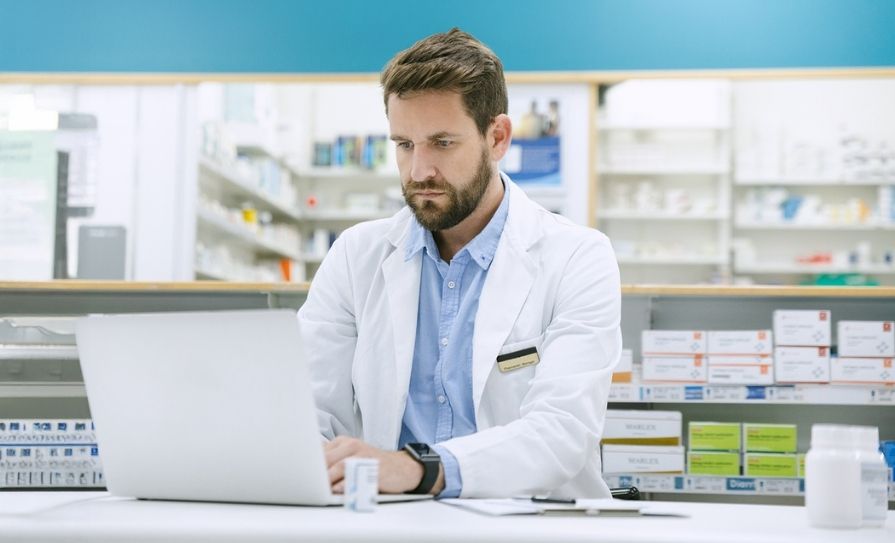Pharmacists are trained to offer advice on the treatment of a variety of ailments – anything from headaches to skin rashes and throw in a bit of roofing and fraud detection for good measure, writes Fintan Moore
The vast majority of the attention that pharmacists receive focuses on our primary function, namely the dispensing of medicines. This is also the main source of our income, so we logically devote the bulk of own efforts to that. What’s often overlooked, especially by various media commentators, is our value as a source of free and instantly available medical advice. This has always been an important role, but is even more so nowadays when GPs are stretched so thinly that appointments can be days away. We are effectively the first step in the triaging process for many patients. It’s probably impossible to accurately estimate the value of this to the health service, but our early interventions save lives as well as money.
A case in point occurred recently in my pharmacy when an elderly lady came in for advice. She had an American accent and asked me for an antihistamine because she had taken “an allergic reaction to an antibiotic”. She added that she’d been taking the antibiotic for a month and had now started to get itchy eyes and a swollen leg. A couple of things weren’t adding up properly in this scenario, so I explained that the antibiotic was unlikely to be the problem, that hayfever was probably causing the itchy eyes, and that I was more worried about the leg. She rolled up her trouser leg and one calf was definitely larger than the other. Fortunately, she also took off her shoe and that revealed some purple discolouration along the side of her foot that hadn’t been there earlier. Due to her accent I asked when she’d flown into Ireland, and she replied it had been just three days earlier and the swelling only started after arriving here. I gave her my opinion that she probably had a blood clot and to get to an A&E department immediately. Mercifully, she did, and she called back a couple of days later to say that I was right and to thank me. I’ll chalk that one up as a win, but, unfortunately, it won’t appear in any other record to show the value of community pharmacy.
The roof of all evil
There is a lot of talk within the profession about young graduates and even not- so-young seasoned pharmacists being disgruntled with their lot. The job is often seen as stressful with the pressures of serving the public and the added burdens of dealing with Byzantine bureaucratic rules and never- ending regulation. In general I’m sure our parents were all very proud of us doing well in our Leaving Certs and going on to college to get a degree leading to “a good job”, but of late I’m coming round to the idea that if you really want to launch your kids on a path to financial success then just buy them a ladder and a clapped-out van with the word ‘Roofer’ on the side of it. My pharmacy has a flat concrete roof covered in felt that has seen better days. A recent deluge of rain found a crack that let some water seep through. It was nothing serious, but less than ideal, so I got a roofer out who patched it up in less than an hour for an amount of money that would have paid a locum pharmacist for at least a full afternoon. My roofer identified other areas in need of attention and gave me a quote for repairing them before heading off to change out of his overalls into a tuxedo and have his limo take him to a Michelin-starred restaurant. Meanwhile I googled Felt Roof Repair, bought the internet-recommended €40 tin of ‘Thompsons 10-Year Roof Seal’ then spent a warm sunny afternoon painting it on. All told, it was easier being on top of the pharmacy fixing cracks in the felt rather than being in it covering up the cracks in the health service.
We are effectively the first step in the triaging process for many patients
Owings in the wind
After a couple of years in the making the long- awaited Owings Protocol is finally becoming a reality in our computer systems. Apart from some very irritating bugs in the upgrade this is a development that I welcome. For too long there have been figures in the HSE and the Department of Health suggesting that there could be high levels of fraudulent activity in community pharmacy. The reality is that any pharmacist committing fraud would be playing a high-risk game because detecting it would be child’s play in the event of a HSE investigation. Anybody familiar with a dispensing package could find patterns of suspect activity in a matter of hours, so it’s telling that we’ve had so few publicised cases. However, if the implementation of the Owings Protocol gives an extra layer of comfort to officials and politicians then that’s a good thing because the huge untapped potential in pharmacy can better be utilised if they approach us cooperatively rather than negatively.
Fintan Moore graduated as a pharmacist in 1990 from TCD and currently runs a pharmacy in Clondalkin. His email address is: greenparkpharmacy @gmail.com.







